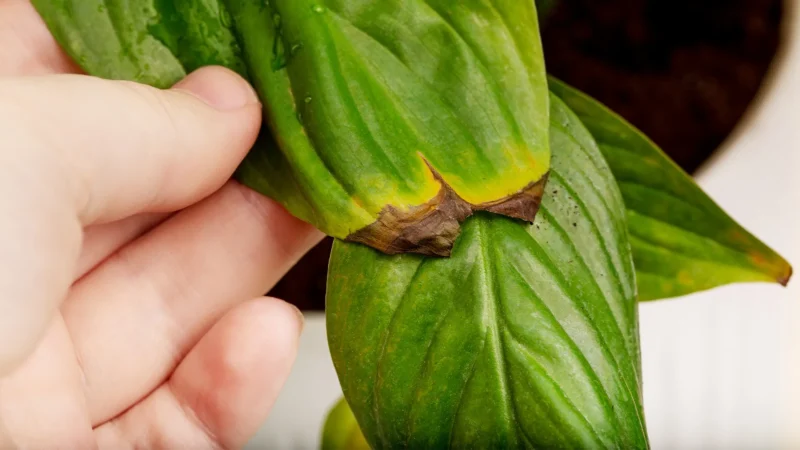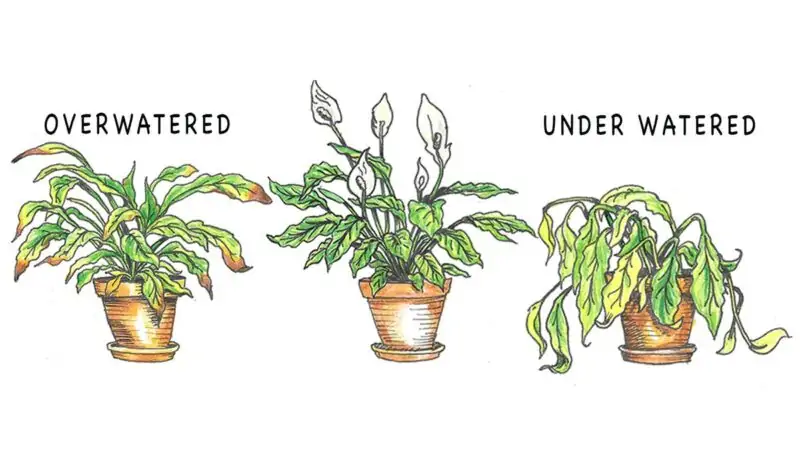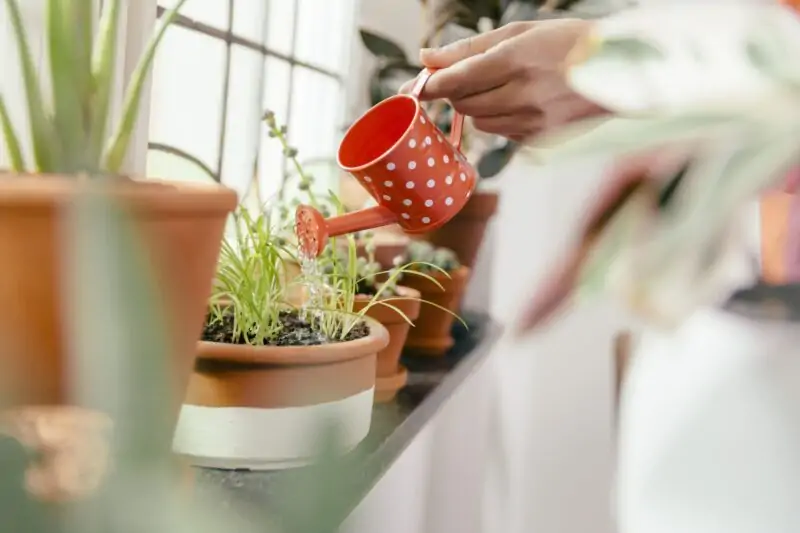Can Overwatered Plant Recover From Overwatering On Their Own?

Today, we’re going to dive into a common gardening hiccup – overwatering your precious plants. We’ll discuss: can overwatered plants recover on their own, and share some tips to help them regain their vigor. So, roll up your sleeves and let’s get our hands dirty!
How to Spot a Plant that’s Had Too Much to Drink
Know the Signs of Overwatering
When you’ve been a bit too generous with the watering can, you might notice these telltale signs:
- Soggy Soil: If your plant’s home is waterlogged, it’s time to reassess your watering habits.
- Wilting Woes: Droopy foliage is a cry for help – those roots are struggling to take in oxygen.
- Yellowing Leaves: Older leaves might turn yellow as they wither away due to poor root function.
- Fungus Gnat Freeloaders: These pesky little flies love damp soil and can multiply in a flash.

A Plant’s Cry for Help: Overwatering vs. Underwatering
Understanding the watering needs of your plants and ensuring proper drainage are key to keeping them happy and healthy.
Can Our Soaked Friends Recover Solo?
Plants are amazing in their resilience, but each species has its own ability to bounce back from overwatering. Some might recover with a little time, while others need a helping hand to survive.
Factors in a Plant’s Comeback
The severity of the damage and the length of time it went unnoticed are crucial factors in a plant’s recovery. Quick action and adjusting your watering habits can make all the difference.
Patience is a Virtue: Recovery Time
Each plant is unique, and recovery times can vary. Succulents might spring back quickly, while ferns could take much longer to regain their lushness.
Lending a Helping Hand: How to Rescue an Overwatered Plant
It’s easy to love our plants too much with overwatering, but if caught early enough, there’s hope! Follow these steps to help your plants recover:
- Put Down the Watering Can: Stop watering your plant for a while to give it a chance to recover.
- Drainage Detective: Check the drainage of your plant’s home and make adjustments if needed.
- Banish Standing Water: Gently remove any excess water around your plant’s roots.
- Keep an Eye on Your Green Friend: Monitor your plant closely and provide extra care if needed.
Repotting and Drying Out: A Fresh Start for Overwatered Soil Get Your Soil and Pot Ready
When repotting, carefully remove the soggy soil and plant your green buddy in fresh, dry potting mix. Choose the right mix for your specific plant type, such as cacti and succulents or ferns and herbs.
Roots Report: Check for Damage
During the repotting process, take a close look at your plant’s root system. Healthy roots are white, but brown or black mushy roots may mean trouble.
Dry Time: Let Your Soil Breathe
After repotting, give the soil a chance to dry out completely before watering again. This can take 1-2 weeks, depending on the plant. Remember to only water when the top inch of soil is dry.
With a little love and care, your overwatered plants can regain their health and bring joy to your home and garden once more.
Rootin’ for Recovery: Promoting Root Health and Bouncing Back
Introduce Good Microbe Buddies
Give your plant’s roots a little TLC by adding beneficial microbes, like mycorrhizae fungi, to the soil mix. These helpful microorganisms break down organic matter, enhance nutrient absorption, and give your plant’s immune system a little pep talk.
Nourish with Nutrients
Offer your recovering plant a nutrient boost with fertilizer. Start with a small dose and work your way up, following the package guidelines. Remember, different plants have different nutrient needs, so choose a fertilizer that suits your green friend best.
Trim Away the Troubles
Sometimes, a little snip-snip is all it takes to bring your plant back to life. Prune away any dead areas on leaves and stems to encourage new growth and keep harmful bacteria or fungus at bay.
By following these steps, you’ll not only help your overwatered plant make a strong recovery, but you’ll also be better prepared to prevent overwatering issues in the future.
Water Wisely: Preventing Overwatering in the Future

Overwatering is an easy mistake to make, but your plants will thank you for learning to avoid it. Too much H2O can cause root rot and may even send your green friends to plant heaven. Fear not, though! Here are some tips to keep overwatering at bay.
Just the Right Amount: Watering Your Plants
Your plant’s water needs depend on factors like humidity, temperature, pot size, and soil type. A good rule of thumb for houseplants is to let the top inch or two of soil dry out before giving them a drink.
Let It Flow: Proper Drainage
Drainage is key to keeping your plants’ roots happy and healthy. When repotting or planting new seeds, make sure your container has at least one hole on the bottom. This lets excess water escape and allows air to circulate in the soil.
Water-Smart Tips to Keep Overwatering in Check
Here’s some advice to help you avoid overwatering:
- Pick pots with reliable drainage holes
- Keep an eye on the moisture level in the soil
- Opt for well-draining potting mixes
- Try self-watering containers for better moisture control
- Be cautious when watering outdoor garden beds during rainy spells
With these tips in your gardening arsenal, you’ll be well on your way to maintaining happy, healthy plants without drowning their roots.
FAQs
If you’re new to plant care, understanding overwatering and underwatering can be confusing. Here are some frequently asked questions to help you identify the signs of an overwatered or underwatered plant.
There are several ways to tell if your plant is over or under-watered. If leaves are yellow and falling off, the roots may not be getting enough water. If they’re soggy and wilt easily when touched, they might have been given too much moisture.
The recovery time for an overwatered plant depends on factors such as how long it was overwatered, the plant type, humidity levels, and temperature ranges. Generally, most houseplants should start showing visible signs within 7-14 days after stopping excessive watering.
Plants prefer room temperature tap water with low mineral content, like rain or distilled water. Using bottled spring water is also acceptable. Avoid pouring cold liquids into dry soil mixtures, as sudden changes can shock delicate cells and cause harm.
Excess water in soil without proper drainage prevents air circulation, leading to stagnant conditions where fungus thrives. Oxygen-deprived roots suffer and become more susceptible to infections, eventually dying even if changes are made afterward.
Conclusion
Overwatering damages plants by depriving their roots of necessary oxygen and promoting harmful fungi growth, disrupting growth cycles, and eventually killing them. It’s essential to consider whether overwatered plants can recover on their own. Always keep track of how often you water plants and resist the urge to overdo it.